
EU Reacts to CoE Consolidated Report on Conflict in Georgia
The European Union welcomed on November 10 the release of the 24th consolidated report on the conflict in Georgia, filed by the Secretary General of the Council of Europe (CoE) Marija Pejčinović Burić. The EU highlighted the importance of keeping “this issue for the political agenda of the Council of Europe” and encouraged the Secretary General to continue submitting reports.
The European Union condemned the organization of “illegal polling stations” in occupied Abkhazia and Tskhinvali Region/South Ossetia for the Russian State Duma elections held on 17-19 September 2021, and reiterated “grave concern” on the continuing “Russian illegal military presence.”
It regretted that “no progress has been made to implement the Deputies’ decisions on the conflict in Georgia,” including May 12, 2021 decision. The EU also reiterated its call on Russia for “proper follow-up” to the January 2021 ECHR ruling into the 2008 Russo-Georgian war case, according to which Russia “violated several provisions of the European Convention on Human Rights.”
Deploring “the continuous deterioration of the human rights and security situation” in the occupied regions, the EU said the “ongoing violations of the freedom of movement severely affect the security, safety, and well-being of the local population.”
Welcoming the reopening of the Enguri crossing point between Georgia proper and Abkhazia, the EU voiced regrets that restrictions were imposed for the day of the local elections in Georgia. It called for the immediate reopening of the crossing points between Tskhinvali Region and Tbilisi-controlled territory and the release of Georgian citizens arbitrarily detained by the Kremlin-backed authorities.
The EU denounced “continuous discrimination of Georgians on the grounds of ethnicity” in the occupied regions and raised concerns over various restrictions on freedom of movement, residence rights, work and property rights, and access to services and native language education.
The EU condemned “Russia’s illegal decision to sign the so-called agreement on dual citizenship with Tskhinvali” on September 20, 2021. It also voiced regrets on an absence of progress regarding the return of internally displaced persons to their homes.
The statement also highlighted “the unilateral delineation of the state border between Georgia and Russia on segments of the Georgian territories,” the cadastral map modification of Russia to include the village of Aibgha of Gagra municipality in Abkhazia. The EU slammed the move as “a step towards de facto annexation of the Georgian territories.”
It also reiterated its call for justice to be delivered and a proper investigation into the tragic deaths of Georgian nationals Archil Tatunashvili, Giga Otkhozoria, David Basharuli, Irakli Kvaratskhelia as well as the death of Tskhinvali resident, inmate Inal Jabiev. The EU also called for the immediate release of arbitrarily arrested Irakli Bebua, an ethnic Georgian resident of Gali district in Abkhazia, who was charged with nine years and needs continued medical care.
The EU welcomed Georgia’s commitment to a peace policy, including “State Strategy for De-Occupation, and Peaceful Conflict Resolution,” and encouraged increased efforts in addressing the fate of missing persons. It also expressed worries over continuous tensions in the Chorchana-Tsnelisi area. The EU deplored the ongoing “borderisation” activities and urged its immediate termination.
The statement reiterated the EU’s commitment to supporting peacebuilding and conflict resolution, through engaging in the Geneva International Discussions (GID), as well as in the Incident Prevention and Response Mechanisms (IPRMs) and through the work of the EU Monitoring Mission (EUMM).
“We reiterate our unwavering support for the independence, sovereignty, and territorial integrity of Georgia within its internationally recognized borders,” the statement concluded, calling on Russia to fulfill its obligations under the 2008 Ceasefire Agreement.
Albania, Andorra, Georgia, Liechtenstein, Moldova, Monaco, Montenegro, Republic of North Macedonia, San Marino, United Kingdom, and Ukraine also aligned with the statement.
Read Also:
- EU Statement on CoE SecGen’s 23rd Report on Conflict in Georgia
- CoE Issues 23rd Report on Conflict in Georgia
- EU Statement on CoE’s Report on Conflict in Georgia
- CoE Committee of Ministers Decision on Conflict in Georgia